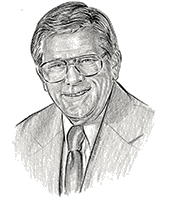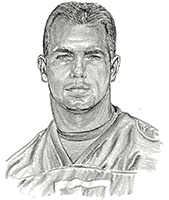It seemed that Sam Rutigliano never met a person he didn’t like. And if he ever did, it’s likely he still found time to talk to them. Unlike too many of the football coaches at this time, Rutigliano was as outgoing and gregarious as any coach the Cleveland Browns have ever had during his tenure as head coach from 1978 to 1984. While his Cleveland coaching ledger might show a 47-50 record, the entire North Coast is forever linked with Rutigliano’s 1980 Kardiac Kids team. The silence was deafening on that bitter Sunday after Red Right 88 wound up as the heartbreaking interception that ended the Cleveland season, but Rutigliano has done more than his share to put the game and life in perspective since then. When the NFL was drifting into society’s infatuation with cocaine in the 1980’s, Rutigliano made his most important off-the-field call by establishing the team’s anonymous support group, the Inner Circle. It remains more important to Sam than any win or loss. The native of Brooklyn N.Y., whose East Coast accent has become familiar in these parts, put together a football resume that included playing college football at Tennessee and Tulsa, high school in New York. college coaching at Connecticut, Maryland and Tennessee, and NFL positions with Denver, New England, the New York Jets and New Orleans before taking the Browns head coaching job. After doing some broadcasting work, he was served as the head coach at Liberty University for 11 seasons until 1999. Now we see and hear him on local radio and television shows as he dissects the home team. It would have been nice to get one more win at the end of that long ago special season, but Rutigliano has shown himself to be a special winner when it comes to the courageous matters in life.
Diana Munz is arguably the greatest swimmer to come out of the Cleveland area. Raised in Moreland Hills and a 2000 graduate of Chagrin Falls High School, she owns three Olympic medals: a gold as a member of the winning 800-meter freestyle relay team at the 2000 Sydney Olympics, a silver for the 400-meter freestyle at Sydney and a bronze for the 800-meter freestyle at the 2004 Athens Olympics. Munz got her start as an age group swimmer for the Lake Erie Silver Dolphins. It did not take long for her to advance to senior competition, where she won 21 national titles. Diana’s swimming career took her all over the world. Some examples: at the World Aquatic Championships in Perth, Australia in 2001, she won silver in the 800-meter freestyle; in 1997 at the Pan Pacific Swimming Championships in Fukuoka, Japan, she won silver in the 1500-meter freestyle, bronze in the 400-meter freestyle and bronze in the 800-meter freestyle; in 2003 at the World Aquatic Championships in Barcelona, Spain, she won silver in the 800-meter freestyle and bronze in the 400-meter freestyle. Munz is a graduate of John Carroll University with a degree in communications. She retired from competitive swimming in 2005. In August 2006, she married Palmer DePetro. The couple have a daughter, Sydney Gabriella DePetro, and live in Lyndhurst.
The Cleveland Skating Club was home to Hayes Jenkins when he began making his move in the world of men’s figure skating. In 1948, he was the U.S. junior national champion. Growing up in Akron, Cleveland saw plenty of Jenkins until he moved to Colorado in 1953 to attend Colorado College. He had been a member of five U.S. World Figure Skating teams up until then, finishing fourth at the 1952 Winter Olympics in Oslo, Norway. That set in motion a run of four consecutive U.S. and world championships from 1953 to 1956. At the 1956 Winter Olympics in Cortina, Italy, he put the finishing touch on his remarkable career by winning the gold medal. His younger brother, David, won the bronze medal. Four years later they became bonded gold brothers when David won the 1960 gold medal. Retiring from the ice to attend Harvard Law School, he married 1960 women’s gold medalist Carol Heiss in 1960. Returning to Akron to work in legal affairs for the Goodyear Tire and Rubber Company, he and Carol raised three children and ten grandchildren. Like his wife, he has been honored by numerous organizations throughout the skating world. He retired from Goodyear as Assistant Secretary and Assistant General Counsel in 1998, after which he and Carol moved to Westlake to be closer to his her coaching site. For nearly 50 years, they have been the area’s first family of figure skating.
She was the Golden Girl of ladies figure skating for nearly a decade. The world took early notice of Carol Heiss Jenkins when she was the 1951 U.S. Novice champion and the 1952 national junior champion. The following year, she became the first woman to land a double axel in competition. The native of New York City was only warming up when she won the first of five consecutive world championships in 1956, but had to settle for a silver medal at the 1956 Winter Olympics in Cortina, Italy. There was no stopping her after that as the United States and world championships belonged to her from 1957 to 1960, with her career culminating in a gold medal performance at the 1960 Winter Olympics in Squaw Valley, California. She stayed in the public eye for a time with the distinctive movie “Snow White and the Three Stooges” in 1961 and as a television commentator. Her marriage to gold medalist Hayes Jenkins in 1960 brought her to Akron. Two decades later, the lure of the ice took her to Lakewood’s Winterhurst Rink where she became one of the nation’s top skating teachers. During more than 25 years at Winterhurst, she has coached internationally ranked skaters Tonia Kwiatkowski, Jeni Meno, Lisa Ervin, Timothy Goebel, Miko Ando and Parker Pennington. Residing in Westlake with her husband, she was a 2001 inductee to the Greater Cleveland Sports Hall of Fame.
Rarely does a Division III basketball player make it to the NBA. Barry Clemens not only made it, but carved out an 11-year career, including two seasons, 1972-73 and 1973-74, with the Cavaliers. Clemens was born in Dayton and grew up on a 200-acre farm in Xenia, Ohio. At Xenia High School, where he graduated as the Salutatorian in 1961, Clemens starred in basketball while also running track and cross country. Recruited by numerous Division I colleges, including Ohio State and Ohio University, he instead chose to attend Division III Ohio Wesleyan. In four seasons at OWU, Clemens finished as the school’s and Ohio Athletic Conference’s career leader in scoring, leading the Battling Bishops to a 71-23 record. His career high at OWU of 41 points came against Baldwin-Wallace in January 1965. The New York Knicks made Clemens, a 6-6 forward, the 19th pick of the 1965 NBA draft. It was a draft that also included Bill Bradley, Rick Barry, Walt Frazier and Billy Cunningham. In 11 seasons with five teams, used primarily as a reserve noted for his deadly perimeter shooting, Clemens averaged 6.7 points and 3.2 rebounds. Today, he is Managing Director for Wachovia Securities and lives in a Cleveland western suburb with Vivian, his wife of 42 years. They are the parents of three children: Justin, Jennifer and Matthew.
You have seen Bobby Brown hundreds of times over the years. But you never noticed him, and that’s just how he liked it. Involved in basketball and football officiating for half century, all Brown wanted everyone to know was that the call on the floor or field was the right one. It nearly always was just that. After attending Rhodes High, Baldwin Wallace College and a Captain’s tour with the U.S. Army Air Corps in World War II, Brown settled down with his wife Dorothy in Parma. He began officiating basketball and football games in 1948 and never stopped. He spent 33 years working football games, 24 at the collegiate level. He was president of the International Association of Approved Basketball Officials-Board No. 55 in 1959-60. Besides 25 sectional, 23 district and 18 regional high school tournaments, he refereed three state football championships. In Cleveland, he officiated 14 city championship basketball games and 12 football title games. He has been a high school basketball rules interpreter and spent 24 seasons as an observer for the Ohio Athletic Conference football officials and 24 as Cleveland State’s basketball observer. Somehow he found time to serve terms as the Parma School Board President in the 1960’s and head the Cleveland Touchdown Club in the 1980’s. Numerous awards have come Brown’s way over the years for his steadfast dedication and unassuming dignity. At age 90, he adds this latest honor in his typical humble fashion. It’s the right call once again.
Deceased.
A 5-foot-9, 178-pound wide receiver willing to go over the middle to catch a pass in the National Football League is one tough customer. Brian Brennan did it for nine seasons, eight of them with the Browns. Whatever Brennan lacked in size, he more than made up for it in courage. Brennan caught the attention of NFL scouts in the early 1980’s when he was on the receiving end of passes thrown by heralded Boston College quarterback Doug Flutie. He holds the single-season BC record for catches (66) in 1984. The Browns made Brennan a fourth-round selection (104th pick overall) in the 1984 draft, and it turned out to be one of the great fourth-round picks in franchise history. In eight seasons with the Browns (1984-91), Brennan had 315 catches (currently tied for fourth in club history), with 20 touchdowns. Brennan’s best season with the Browns was in 1986, when he made 55 catches for 838 yards and six TD’s. One of the most memorable TD grabs Brennan made occurred in the AFC Championship game against Denver in January 1987. Brennan’s 48-yard catch from Bernie Kosar gave the Browns a 20-13 lead with 5:43 left in the fourth quarter. The Cleveland Stadium crowd smelled the Browns first Super Bowl appearance. Alas, it never happened. What unfolded instead was “The Drive”, John Elway’s 98-yard march that ended with a touchdown, after which the Browns went on to lose in overtime. Brennan, whose career ended with the Bengals and Chargers in 1992, had 334 receptions during his career for 4,338 yards and 20 TDs in 132 NFL games. Married to wife Bethany, Brennan is an executive for KeyBank Corporation and has served as the Director of Football Operations at Gilmour Academy.
Bill Borchert saved his best for last.
After a standout career at Holy Name High, the prolific playmaker took his talents to Mount Union College in Alliance. The Division III powerhouse was still in its infancy when it came to national championships; the Purple Raiders had just one to their credit when Borchert hit campus in 1994. After going 22-3 his first two season, including a pair of losses in the playoffs, Borchert guided the Raiders to consecutive 14-0 seasons and two national titles, jump-starting Mount Union’s 54-game winning streak. Along the way, his numbers, like those of the Raiders, were staggering. He completed 671 of 1,009 passes for 10,201 yards and 141 touchdowns. In the 1996 Stagg Bowl win against Rowan, he passed for a record seven touchdowns and 505 yards. A year later, the Raiders racked up 697 yards of offense against Lycoming, with Borchert supplying six scoring passes and 411 yards. Those feats did not go unnoticed as he was named the Division III national player of the year as a junior and senior, earning both the Melberger Award and Gagliardi Trophy in his final season. The Cleveland Touchdown Club honored him with the Joe Fogg Memorial Award as the premier collegiate player in 1997.
Borchert is in software sales for IBM, based in Cleveland, and lives in Broadview Heights with his wife Erin and daughters Lauren and Emily.
2001 Crocker Rd., Ste. 510, Westlake, OH 44145
Phone: 216-241-1919








